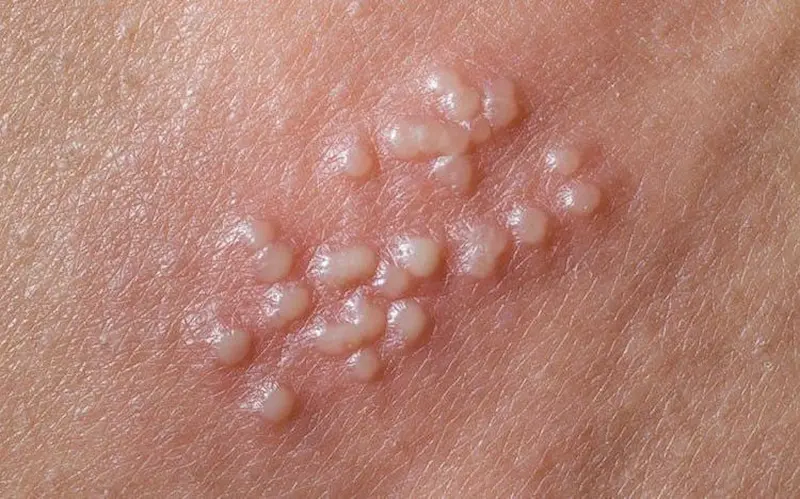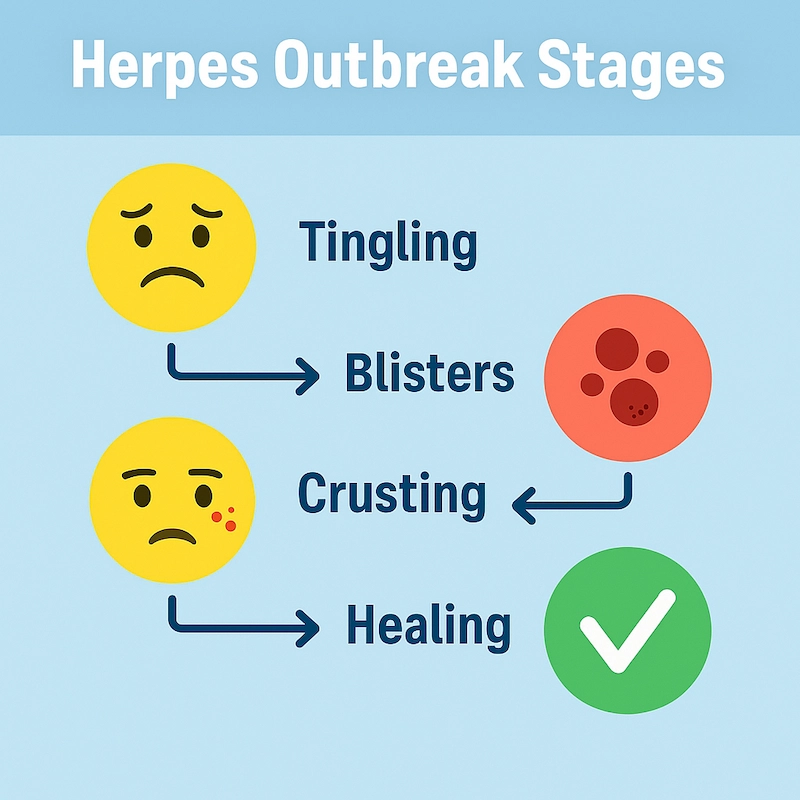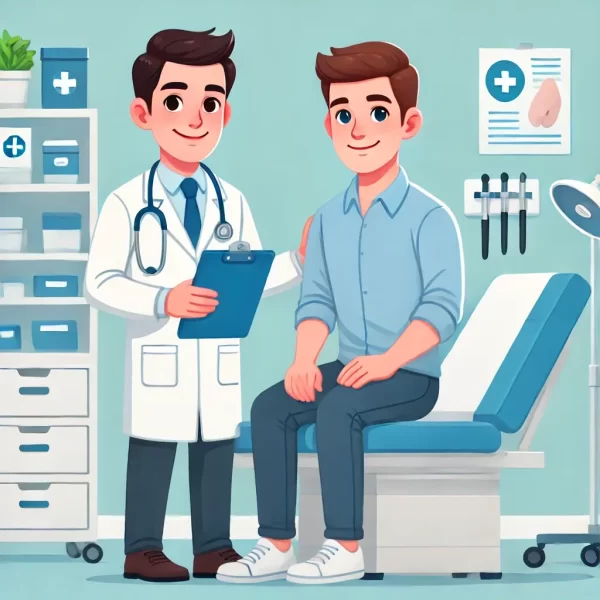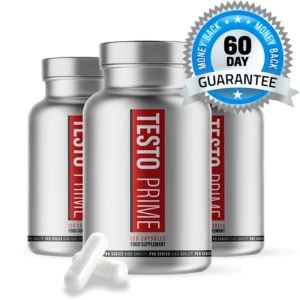Genital herpes is one of the most common sexually transmitted infections (STIs) in men, caused by the herpes simplex virus (HSV) – either type 1 (HSV-1) or type 2 (HSV-2). While it has no cure, herpes is manageable with the right treatment and lifestyle choices. In this article, we’ll explore symptoms, testing, transmission, and outbreak prevention in men.
What Is Herpes Simplex Virus (HSV)?
Herpes in men is caused by the herpes simplex virus (HSV)—a highly contagious virus that stays in the body for life once contracted. It causes painful sores or blisters, most often around the genitals, anus, or mouth, and can lead to recurring outbreaks.
There are two main types of HSV:
HSV-1 (Herpes Simplex Virus Type 1)
- Typically causes oral herpes (cold sores around the mouth)
- Can also cause genital herpes through oral sex
- Increasingly responsible for genital infections in young men
HSV-2 (Herpes Simplex Virus Type 2)
- Primarily causes genital herpes
- More likely to cause recurrent outbreaks than HSV-1
- More commonly transmitted through sexual contact
Once Infected, Always Infected
- HSV remains in the body for life and lies dormant in the nerve cells
- It can “reactivate” at any time, leading to periodic outbreaks
- The virus can also be transmitted even without visible symptoms through asymptomatic viral shedding
How Common Is It?
- Over 1 in 6 adults in the U.S. has genital herpes
- Many don’t know they’re infected due to mild or no symptoms
- Men aged 20–40 are among the most commonly affected groups
📌 While herpes has no cure, it’s highly manageable—and understanding the virus is the first step to taking control of your sexual health.

How Do Men Get Herpes?
Herpes in men is spread through direct skin-to-skin contact, most often during sexual activity. Unlike some STIs that require fluid exchange, HSV can be transmitted even without ejaculation or visible sores—making it one of the easiest STIs to catch.
1. Vaginal, Anal, and Oral Sex
Herpes is commonly transmitted through:
- Vaginal sex → genital herpes
- Anal sex → genital or anal herpes
- Oral sex → oral-to-genital transmission (HSV-1 causing genital herpes)
Even brief contact with infected skin or mucosa is enough to spread the virus.
2. Asymptomatic Shedding
- The herpes virus can be present on the skin even when there are no symptoms
- This is called asymptomatic viral shedding
- It’s responsible for a large percentage of transmissions
📍 You or your partner may not even know you’re contagious.
3. Skin-to-Skin Contact (Non-Sexual)
- Kissing, oral contact, or sharing personal items (e.g., razors, lip balm) can spread HSV-1
- HSV-2 is rarely spread this way but possible under certain conditions
4. Recurrent Risk and Reinfection
- You can be infected with both HSV-1 and HSV-2
- Having HSV-1 doesn’t protect you from HSV-2
- Reinfection is rare but reactivations (outbreaks) can happen frequently
📈 5. Risk Factors for Men
You’re more likely to contract herpes if you:
- Have multiple sexual partners
- Don’t consistently use condoms or barriers
- Started having sex at a young age
- Are HIV-positive or immunocompromised
- Are in a relationship with someone who has herpes
📌 Herpes spreads easily and often silently—but with awareness and preventive habits, you can lower your risk significantly.
Symptoms of Herpes in Men
Herpes symptoms in men can vary widely. Some experience painful, visible outbreaks, while others have mild or no symptoms at all. The virus behaves differently during the first outbreak and subsequent recurrences.
1. First Herpes Outbreak (Primary Infection)
This is usually the most intense episode, occurring 2–12 days after exposure.
Common symptoms:
- Painful blisters or sores on the penis, scrotum, anus, or thighs
- Redness, swelling, and irritation in the genital area
- Itching, burning, or tingling before blisters appear
- Flu-like symptoms: fever, fatigue, headache, swollen lymph nodes
- Pain during urination (if sores are near the urethra)
📍 Sores typically break open, crust over, and heal within 2–4 weeks.
2. Recurring Outbreaks
After the initial episode, the virus stays dormant in the nerves and may reactivate.
Recurrence features:
- Usually milder and shorter than the first outbreak
- May occur several times a year, especially in the first 12 months
- Warning signs (prodrome): tingling, burning, or itching in the same area
- Sores heal within 7–10 days
📌 Frequency of outbreaks tends to decrease over time.
3. Common Sites of Herpes in Men
Depending on how the virus was contracted:
Genital herpes (HSV-2 or HSV-1):
Penis, scrotum, groin, anus, buttocks
Oral herpes (HSV-1):
Lips, mouth, gums, tongue
Perianal herpes (especially in MSM):
Around the anus or inside the rectum (can mimic hemorrhoids)
4. Asymptomatic Infections
- Many men have herpes but never show symptoms
- You can still spread the virus during asymptomatic shedding
- This is why many people don’t know they’re infected
📌 Recognizing the signs of herpes—especially early tingling or burning—can help you act quickly to reduce outbreak severity and avoid transmission.

Complications of Herpes in Men
While herpes is not usually life-threatening, it can still lead to physical, emotional, and social complications—especially if outbreaks are frequent or left unmanaged.
1. Painful Urination and Urethritis
Sores near the urethral opening can cause:
- Burning pain during urination
- Urethral inflammation (non-gonococcal urethritis)
- Temporary urinary retention in severe cases
2. Increased Risk of HIV
Herpes significantly raises the risk of contracting or transmitting HIV due to:
- Open sores that provide an entry point for the virus
- Immune activation that promotes viral replication
📌 Men with herpes are 3–5 times more likely to contract HIV if exposed.
3. Herpes Proctitis (in MSM)
In men who have receptive anal sex, herpes can infect the rectum, causing:
- Painful bowel movements
- Rectal bleeding or discharge
- Mimics other conditions like hemorrhoids or inflammatory bowel disease
4. Eye Infections (Ocular Herpes)
HSV can spread to the eyes through hand-to-eye contact:
- Redness, pain, light sensitivity
- Can lead to vision loss if not treated promptly
5. Psychological and Emotional Impact
For many men, a herpes diagnosis can lead to:
- Anxiety or depression
- Fear of rejection or stigma
- Sexual confidence issues
- Avoidance of relationships
📍 These effects are common but manageable with education, counseling, and support.
📌 While herpes doesn’t cause long-term damage in most healthy men, understanding and managing its risks is crucial—both for physical and mental well-being.
Herpes Testing and Diagnosis
Since many men with herpes may have mild or no symptoms, the only way to know for sure is through proper testing. Herpes can’t be diagnosed based on guesswork—it requires laboratory confirmation to be accurate.
1. When Should You Get Tested?
You should get tested for herpes if:
- You notice blisters, sores, or unusual irritation in the genital or anal area
- You experience burning during urination without another explanation
- A sexual partner has been diagnosed with herpes
- You’ve had unprotected sex with a new or multiple partners
- You’re planning a new relationship or trying to conceive
📌 Testing is also recommended even if you don’t have symptoms but suspect exposure.
2. Types of Herpes Tests
There are two main types of herpes testing, depending on your symptoms and the stage of infection:
a) Viral Culture (from a sore)
- Used when active sores are present
- A swab is taken from the blister to detect live virus
- Most accurate when performed within 48 hours of onset
✅ Confirms HSV-1 or HSV-2
❗ Not effective if the sore has started healing
b) PCR Test (Polymerase Chain Reaction)
- Highly sensitive molecular test
- Detects viral DNA from a swab or blood
- Can identify HSV type and location
✅ More accurate than culture
✅ Works even with small or healing lesions
c) HSV Blood Test (Antibody Test)
- Detects antibodies to HSV-1 and HSV-2 in your blood
- Useful if no visible symptoms are present
- Can determine past exposure (not recent infection)
📌 Some tests distinguish between HSV-1 and HSV-2, but not all do—ask your provider.
❗ Limitations of Testing
- A negative result doesn’t always rule out infection (especially early on)
- Antibodies may take 2–12 weeks to appear after exposure
- Blood tests can’t tell where the infection is located (oral or genital)
📌 Herpes testing is simple, confidential, and often covered by insurance or available at low-cost clinics. If in doubt—get checked out.
Treatment and Outbreak Management
Although there is no cure for herpes, the infection is highly manageable with antiviral medication and lifestyle strategies. The goal is to:
- Shorten outbreak duration
- Reduce outbreak frequency
- Lower the risk of transmission
1. Antiviral Medications
The three most commonly prescribed antiviral drugs for herpes are:
- Acyclovir
- Valacyclovir (Valtrex)
- Famciclovir
These medications work by inhibiting viral replication, helping your immune system control the infection.
🩺 2. Two Types of Treatment Approaches
a) Episodic Therapy
- Taken at the first sign of symptoms (tingling, burning, or appearance of sores)
- Helps reduce the severity and duration of outbreaks
- Usually a 5-day course of antivirals
📌 Best for men with occasional or mild outbreaks
b) Suppressive Therapy
- Daily antiviral medication, regardless of symptoms
- Reduces frequency of outbreaks by up to 70–80%
- Lowers risk of transmitting herpes to sexual partners
📍 Recommended for:
- Men with frequent outbreaks (≥6 per year)
- Those with an HIV-positive partner
- Individuals with high levels of emotional distress from herpes
3. Managing Symptoms During Outbreaks
- Keep the area clean and dry
- Wear loose-fitting underwear
- Use over-the-counter pain relief (e.g., ibuprofen)
- Apply ice packs wrapped in cloth to reduce swelling
- Avoid touching the sores and wash hands often
📌 Avoid sexual activity during outbreaks to prevent spreading the virus.
4. Tracking and Reducing Recurrences
Common outbreak triggers include:
- Stress or fatigue
- Illness or fever
- Sun exposure (especially for oral herpes)
- Friction during sex
- Weakened immune system
Keeping a symptom diary can help identify and avoid personal triggers.
📌 While herpes isn’t curable, it is absolutely controllable. With the right treatment plan, most men lead completely normal, fulfilling lives.
Preventing Herpes Transmission
Even though herpes is a lifelong infection, you can still have a safe and healthy sex life. With the right precautions, the risk of spreading herpes to a partner can be significantly reduced.
✅ 1. Avoid Sexual Contact During Outbreaks
- Herpes is most contagious when sores are present
- Avoid all genital, oral, and anal sex from first symptoms to complete healing
- Viral shedding may still occur even after sores disappear, so caution is key
📌 If you feel tingling, burning, or itching—pause all sexual activity.
✅ 2. Use Condoms and Dental Dams
- Condoms reduce the risk of herpes transmission by about 30–50%
- Use for vaginal, anal, and oral sex
- Dental dams can reduce oral-to-genital and oral-to-anal transmission
📍 Note: Condoms don’t cover all skin that can shed virus, so risk is reduced—not eliminated.
✅ 3. Take Daily Suppressive Therapy
- A daily dose of valacyclovir or acyclovir can lower transmission risk by up to 50%
- Especially effective when combined with condom use
- Helpful for men with frequent outbreaks or long-term partners
✅ 4. Be Honest with Your Partner
- Disclose your herpes status before becoming sexually active
- Most people appreciate honesty and openness
- Give your partner the chance to make informed decisions
📌 Honest conversations build trust—and help protect both of you.
✅ 5. Encourage Partner Testing
- Your partner may already have HSV-1 or HSV-2 without knowing it
- Blood tests can check for antibodies
- Helps clarify shared risk and choose the best protection strategy
✅ 6. Strengthen Your Immune System
- Get adequate sleep, reduce stress, and eat a balanced diet
- Stay active and hydrated
- Avoid excessive alcohol or smoking
A healthy immune system helps keep the virus in check and reduces outbreak frequency.
📌 Herpes doesn’t define your worth—and it doesn’t have to define your sex life. Taking proactive steps keeps you and your partner safe and informed.
FAQs About Herpes in Men
Can herpes be cured?
No. There is no cure for herpes, but it can be effectively managed with antiviral medication and healthy habits. Most men live normal lives with minimal disruption.
Can I have herpes without symptoms?
Yes. Many men carry the virus without ever showing visible signs. However, they can still transmit the virus through asymptomatic shedding.
Is herpes contagious even when there are no sores?
Yes. Asymptomatic viral shedding means herpes can be spread even without visible blisters or symptoms. Suppressive therapy reduces this risk.
How often will I have outbreaks?
It varies. Some men experience only one outbreak, while others have recurring flare-ups several times a year—especially in the first year after infection.
Can I have a relationship or sex life with herpes?
Absolutely. With honesty, communication, and protection (condoms + medication), many couples manage herpes safely. Disclosure builds trust and reduces fear.
Should I tell my partner I have herpes?
Yes. It’s not only ethical—it’s a chance to have an open conversation, show maturity, and protect your partner’s health. Most partners appreciate honesty.
Final Thoughts
Herpes in men is common, manageable, and nothing to be ashamed of. While there’s no cure, modern treatments make it easy to control outbreaks, reduce transmission risk, and live a healthy, confident life.
The keys are:
- Learn how the virus works
- Get tested if you suspect exposure
- Start treatment early
- Communicate openly with partners
- Prioritize your emotional and physical well-being
👉 Herpes may be lifelong, but it doesn’t define you. With the right knowledge and support, you’re still in full control of your health—and your happiness.





